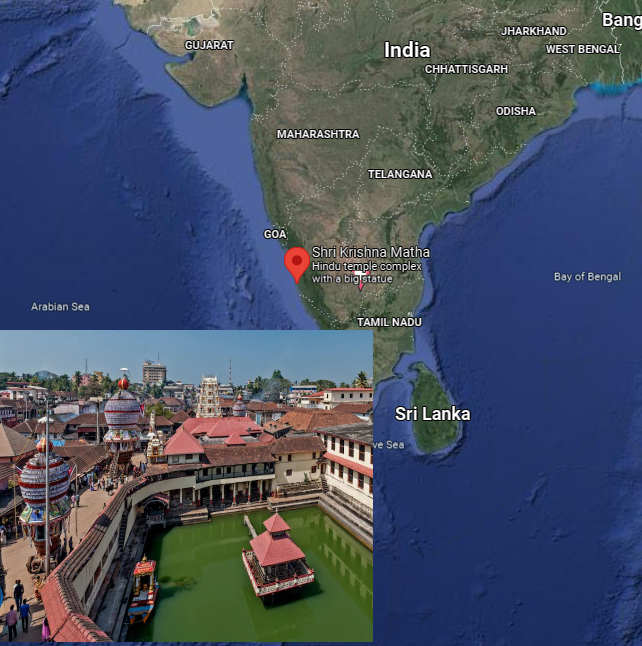

Madhvacharya, who lived in the 13th century (CE 1238–1317), was born in Udupi, Karnataka, India, in the hamlet of Pajaka. He became a monk at an early age and studied under guru Achyutapreksha, who was a practitioner of the popular advaita philosophy. From the start, Achutapreksha noticed Madhva as a highly intelligent student with an impressive memory.
Madhva pondered deeply into the Sanskrit scriptures. He noted that classical Vedic darshanas, such as Sānkhya, Yōga, Nyāya, and Vaishēshika supported the idea of multiple souls. All classical Vedic darshanas also detailed how each soul depends on the omnipotent Supreme Being, God. Vaishnava, Shaiva, and Shakta agamas and their practices diverged from the advaita doctrine. They also advocated a multiplicity of souls, supremacy of God, and realism. After his detailed research and investigation, he was convinced that the original Vedanta philosophy based on Vedavyasa's Brahma-sutras supported realism and the dualistic worldview and not the idealism advocated by advaita.
It caused him great anguish when Vedanta was misinterpreted by the advaita doctrine, which believed in the unity of the God and multiple souls. Worshipping the all-powerful God, full of auspicious qualities (Sat-Chit-Ananda), as without attributes (nirguna) was opposed to scriptures. This, along with the 'maya-vada' doctrine of the world being imaginary and false, caused Vedanta to become more nihilistic and in line with Buddhism. It amounted to atheism, contrary to the tenets of the Vedanta philosophy. The Vedanta philosophy advocated active performance of one's duty and celebrating life as a worship of God.
Vishishtadvaita tried to make improvements to certain aspects of advaita. However, it had its own issues. Conflicts arose from the idea that individual souls were fragments of God's body and the conviction that there was a unity between the God and the soul after liberation. How can the defective soul who is bound and experiencing misery be part of the God, who is all auspicious and all powerful? After death, if the soul gets merged with the God, does it not amount to the annihilation of the Soul? What is the use of such a liberation? This is contrary to Vedanta's belief that claims eternity of the Soul. Madhva didn't accept Vishishtadvaita philosophy either.
Madhva argued that liberation was not just the absence of any defects, but also a state of positive joy that could be experienced to the best of one's ability. In Madhva's opinion, the path is to do one's own duties (swa-dharma) to the best of their abilities. Person's swa-dharma in life is based on the phase of life (ashrama) and occupation (varna) one takes up based on his natural dispostion. Doing Swa-dharma is an act of service to the human race and a dedication to Janardhana, the God who cares for all living things. Therefore, the action should not be motivated by self-interest. He assured the laymen in the society that liberation is possible despite having family duties. He was not in favor of the Buddhist and Jain view that living a life of mendicancy is the only means of emancipation.
He made it his mission to reinstate the lost realistic dualism of Vedanta. He considered Krishna Dwaipayana Vyasa as his only guru. Through intensive study of scriptures, he reinterpreted and wrote his own critical commentaries on the prasthana-traya, the Brahmasutra, Upanishads, and Bhagavat-Gita. He debated the dvaita doctrine with the renowned Advaita and Buddhist intellectuals of his time. His works have been compiled together in a collection known as The Sarvamoola.
He established education centres in various parts of India to propagate the dvaita doctrine. Udupi still stands as a key centre for Madhva's disciples. Bengal's Sri Chaitanya, Mantralaya's Saint Raghavendara, Carnatic music's father Purandara dasa, and the dasa devotional song tradition in India's south all revere him. He advocated using every means to foster devotion to the supreme God. The Puppet shows and Yakshagana art forms in Coastal Karnataka incorporate Ramayana, Mahabharata, and Bhagavata to encourage dvaita doctrine and devotion.
Madhva was a very versatile personality, though a monk. He kept himself in good health, practiced wrestling, and accomplished extraordinary feats. Following are some of the stories that are famous even to this day!

बहुचित्रजगद्बहुधाकरणात् परशक्तिरनन्तगुणः परमः ।
सुखरूपममुष्य पदं परमं स्मरतस्तु भविष्यति तत्सततम् ॥
"The one who has created this variegated vast universe with varied forms has infinite power and is of infinite auspicious qualities. He certainly bestows the highest state of bliss to those who meditate on his ever happy essence." -Dwādasha stōtra 4.3
Contact:
enquire@madhva.in